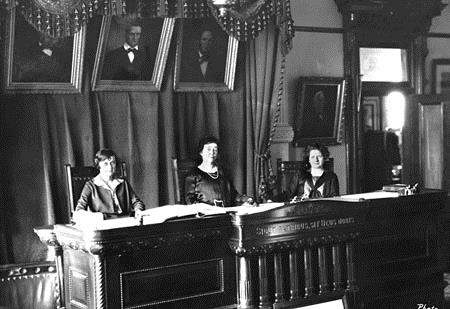Johnson v. Darr
 The All-Woman Court of 1925
Photo courtesy of the Texas State Library and Archives Commission
The All-Woman Court of 1925
Photo courtesy of the Texas State Library and Archives Commission
Under the direction of the Society’s Fellows and the Texas Supreme Court Historical Society Journal, the Society will present a reenactment of one of the Texas Supreme Court’s most famous cases:
Johnson v. Darr, 114 Tex. 516, 272 S.W. 1098 (1925), decided by the “All- Woman Texas Supreme Court.” The reenactment will take place from 10 to 11 a.m. in first floor Conference Room 121A/B at the Fort Worth Convention Center, 1201 Houston St., Fort Worth, Texas, on Thursday, June 16 at the State Bar Annual Meeting.
The principal legal issue the All-Woman Court addressed was whether the trustees of an insurance company, the Woodmen of the World, were entitled to the ownership of two tracts of land in El Paso. In 1922, the Forty-First Judicial District Court of El Paso County granted the trustees clear title to only one of the two tracts, and the Woodmen appealed to the Court of Civil Appeals. Another appeal brought the case to the then three-member Texas Supreme Court in 1924. The case presented a problem to the all-male Supreme Court. The insurer, Woodmen of the World, was a fraternal organization and mutual insurance company whose membership included many prominent and politically powerful men of the time. That large group of men included all three Justices of the Texas Supreme Court.
After the court’s three Justices recused themselves, Governor Pat Neff, an early proponent of women’s rights, decided to appoint three women to take their place. But Governor Neff’s staff failed to do their homework before he made his appointments. The staff did not ask two of Governor Neff’s first three appointees—Nellie Robertson of Granbury and Edith Wilmans of Dallas—whether they had the seven years of legal experience required by the Texas Constitution to serve on the special panel of the court. And they did not check to see if the appointees’ spouses were insured by the Woodmen. Yet Governor Neff made a good choice with Hortense Sparks Ward of Houston, the first woman admitted to the State Bar of Texas.
In 1925, fewer than ten women had the constitutionally-required seven years of experience necessary to serve on the Texas Supreme Court at the time of Governor Neff’s appointments. After Ms. Robertson and Ms. Wilmans withdrew their names because of their constitutional inabilities, Governor Neff made substitute appointments to serve as associate justices: Ruth V. Brazzil of Galveston and Hattie L. Henenberg of Dallas. Houstonian Hortense Ward became Chief Justice and her new colleagues served as the special court’s associate justices.
Long before the All-Woman Court convened, Chief Justice Ward led the successful movement to enact Texas’s first Married Woman’s Property Rights Act and spearheaded the suffrage movement in Texas. Associate Justice Henenberg was the first Jewish member of the Texas Supreme Court. Associate Justice Brazzil played a prominent role in leading South Texas women into social reform movements. Since the women of the All-Woman Court came from different parts of Texas, this is an ideal program for a State Bar Annual Meeting.
The Society’s e-journal has published several articles about the All-Woman Court, including one written and illustrated by Chief Justice Hortense Sparks Ward’s great-granddaughter, Linda Hunsaker. Ms. Hunsaker authored the most recent article and provided previously unpublished photographs, correspondence, and Ward family records in her article “Family Remembrances and the Legacy of Chief Justice Hortense Sparks Ward,” 4(4) Texas Supreme Court Historical Society Journal (Summer 2015): 51–64,
http://texascourthistory.org/Content/Newsletters//TSCHS%20Journal%20Summer%202015.pdf.
David Furlow has photographed the Johnson v. Darr file at the Texas State Library and Archive in Austin and has obtained photographic copies of original pleadings filed by Chief Justice Hortense Sparks Ward in Harris County. Journal staff photographed Chief Justice Ward’s gavel and silver suffragette cup when Linda Hunsaker and her family attended the Society’s and the Texas Supreme Court’s 2013 ceremony marking the publication The Texas Supreme Court: A Narrative History, 1836-1986.
Chief Justice Hortense Sparks Ward’s silver suffragette cup and
the gavel she used during oral argument in the All-Woman Court.
Photo by David A. Furlow
As a result of the Society’s and the Journal’s unique access to previously unpublished archival documents, original photographs, and family records, the Fellows can offer the justices, judges, and attorneys who attend the 2016 State Bar Annual Meeting a uniquely scholarly and historical CLE program. The written materials will include copies of original pleadings, motions, and correspondence among the Texas Supreme Court Clerk’s Office and the justices and parties relating to the January 30, 1925 oral argument in the case.
Texas Supreme Court Chief Justice Nathan Hecht will portray 1925 Texas Supreme Court Chief Justice Calvin Cureton. Fifth Circuit Judge Jennifer Elrod will appear as Special Chief Justice Hortense Sparks Ward. Texas Supreme Court Justices Eva Guzman and Debra Lehrmann will play Special Associate Justices Ruth V. Brazzil and Hattie L. Henenberg.
Additional information can be obtained on the State Bar of Texas Annual Meeting website or through an email to
annualmeeting@texasbar.com.